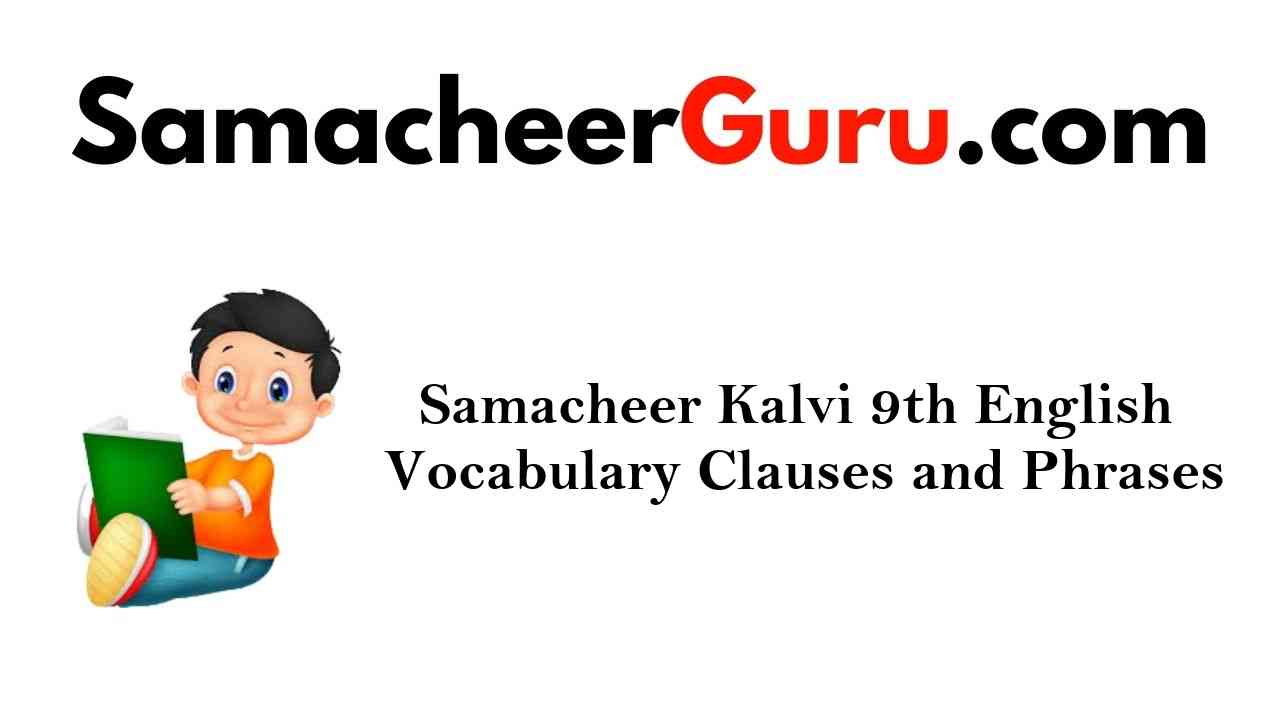You can Download Samacheer Kalvi 9th English Book Solutions Guide Pdf, Tamilnadu State Board help you to revise the complete Syllabus and score more marks in your examinations.
Tamilnadu Samacheer Kalvi 9th English Grammar Clauses and Phrases
A clause is a group of words that contains both a subject and a predicate (or a verb). There are two types of clauses. They are independent clauses and dependent clauses.
Examples
1. Kalpana wants to buy a phone, but she does not have enough money.
(Independent Clause) (Independent Clause)
2. If you don’t study well, you won’t pass the exam.
(Dependent Clause) (Independent Clause)
3. Kavin bought a car which was too expensive.
(Independent Clause) (Dependent Clause)
4. San Jai is a talented player though he is out of form.
(Independent Clause) (Dependent Clause)
Independent Clauses also known as main clauses, are complete sentences. They can stand alone and express a complete thought.
Examples :
- I need a book.
- Mary prefers coffee.
- Ram is a good volleyball player.
Dependent Clauses also known as subordinate clauses contain a subject and a predicate, but they do not express a complete thought.
Examples:
- When it is raining
- Because you were late
- After you go to school
There are three main types of dependent clauses: adjective, adverb, and noun.
An adjective clause describes or gives more information about a noun—tells us which one, what kind, or how many.
Example :
The book that I left on the bus belongs to Mr. Baskar.
An adverb clause describes or gives more information about the verb—tells us when, where, how, to what extent, or under what condition something is happening.
Example :
She was happy because her father gave her a watch.
A noun clause takes the place of a noun in the sentence.
Example :
This is the best route that I know.
Phrases
A phrase is a group of words that forms a meaningful unit, but it is not a complete sentence. In other words, it does not have a subject or a verb.
- the black hat
- blown away
- in the wind
Example :
The red umbrella was blown away in the wind.
There are several kinds of phrases in the English language. Some of the common phrases are described below.
NOUN PHRASES
A Noun Phrase is a group of words made up of a noun and its modifiers.
- the white car
- my English teacher
- the book shop
Example :
The pink house is for sale.
VERB PHRASES
A Verb phrase is a group of words made up of a verb, helping verbs, and modifiers.
- ran quickly to catch
- filled with horror
- dedicated to
Example :
You have woken up everyone in the house.
Exercises
(i) Choose either phrase or clause from the group of words.
1. He works hard every day. (Clause / Phrase)
Answer:
Clause
2. After a good day. (Clause / Phrase)
Answer:
Phrase
3. If I need to call you. (Clause / Phrase)
Answer:
Clause
4. In a dark and dangerous hallway. (Clause / Phrase)
Answer:
Phrase
5. Before the next light. (Clause / Phrase)
Answer:
Phrase
6. Because it’s the right thing to do. (Clause / Phrase)
Answer:
Clause
7. As quickly as possible. (Clause / Phrase)
Answer:
Phrase
8. This car’s not working. (Clause / Phrase)
Answer:
Clause
9. Working for himself. (Clause / Phrase)
Answer:
Phrase
10. Whenever it gets cold. (Clause / Phrase)
Answer:
Clause
Choose either Dependent or Independent for the group of words.
1. Because it’s the best solution. (Independent / Dependent)
Answer:
Dependent
2. Working at this job is a lot of fun. (Independent / Dependent)
Answer:
Independent
3. It doesn’t really interest me. (Independent / Dependent)
Answer:
Independent
4. I should have given her a ride. (Independent / Dependent)
Answer:
Independent
5. After the movie is over. (Independent / Dependent)
Answer:
Dependent
6. If he ever calls. (Independent / Dependent)
Answer:
Dependent
7. Whenever I have the time. (Independent / Dependent)
Answer:
Dependent
8. There could be a problem. (Independent / Dependent)
Answer:
Independent
9. Since the last time they visited. (Independent / Dependent)
Answer:
Dependent
10. Whenever it gets cold (Independent / Dependent)
Answer:
Dependent
